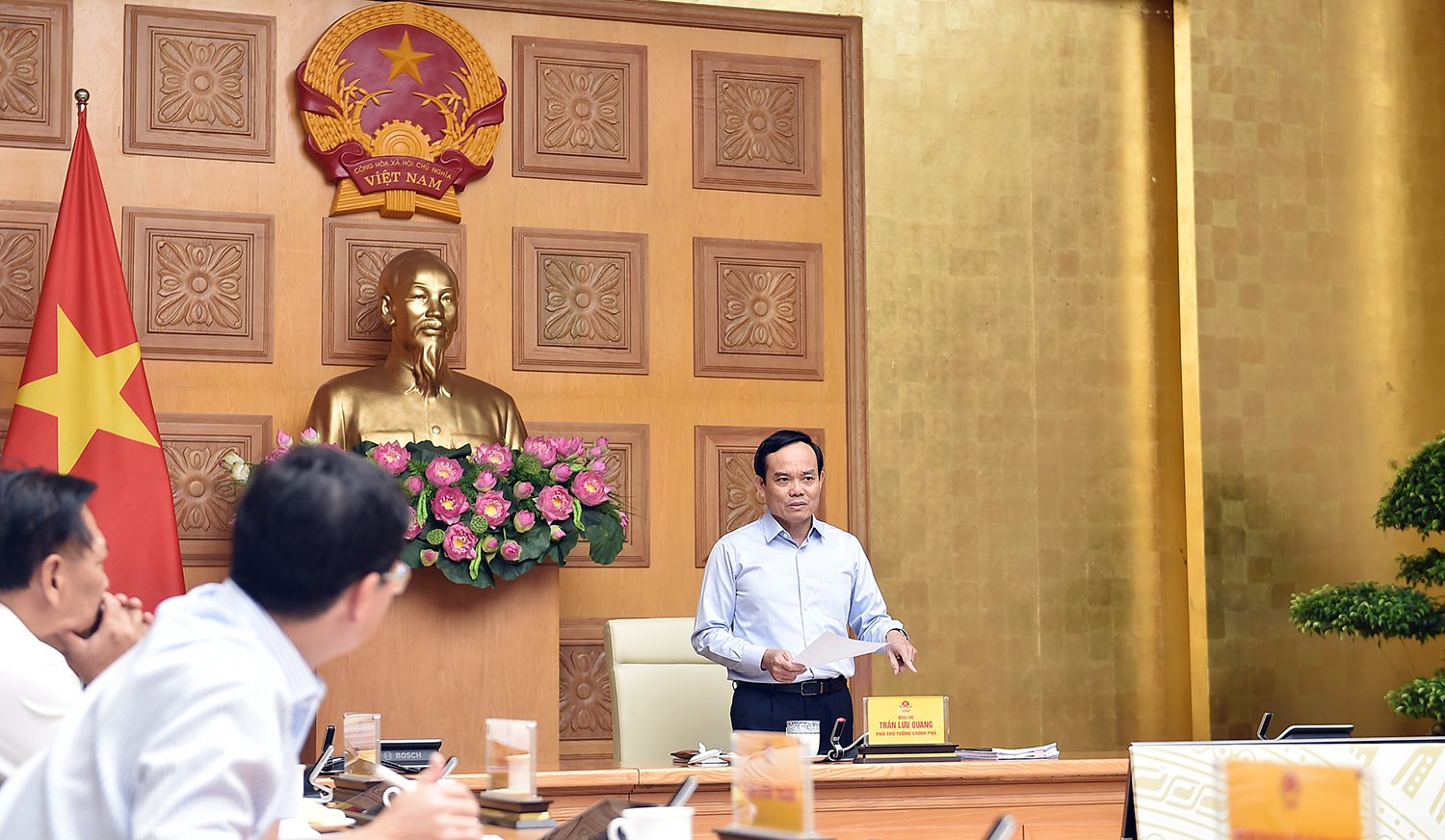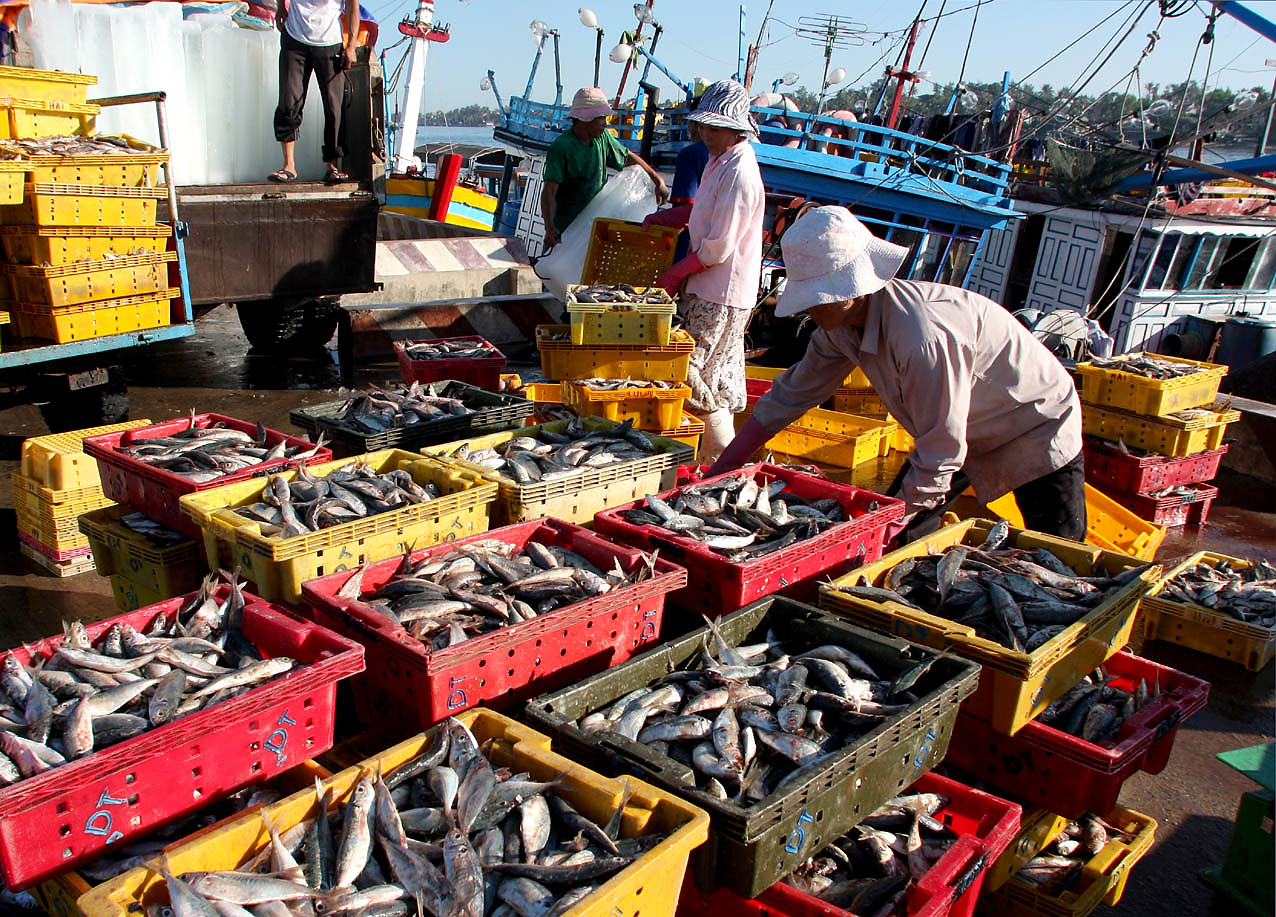May 19, 2025 | 15:54 GMT +7
May 19, 2025 | 15:54 GMT +7
Hotline: 0913.378.918
May 19, 2025 | 15:54 GMT +7
Hotline: 0913.378.918

Deputy Prime Minister Tran Luu Quang requests that the Master Plan enables capital mobilization for 2021-2025 to ensure its feasibility as soon as competent authorities approve it.
On July 18 morning, Deputy Prime Minister Tran Luu Quang chairs a meeting of the Appraisal Council of the Planning on Protection and Production of Aquatic Resources in the 2021-2030 period towards 2050 (hereinafter referred to as the Master Plan).
Commenting on the draft Master Plan, the Planning Dossier Evaluation Council members include all the items specified in the 2017 Planning Law and guiding documents for implementing this Law.
According to Dr. Nguyen Chu Hoi, Vice Chairman of the Vietnam Fisheries Association and Appraisal Council member, the dossier's individual components are carefully prepared, structured per the requirements, and should be easy to follow. The documents’ content and form are presentable and well-derived, grounded on scientific and practical proofs.
The report is up-to-date, reliable, and reflects reality-based information in our country, besides analysis of the international and regional areas, and will influence our country’s fisheries in the near future.
The Master Plan report has been thoroughly revised based on self- and peer-review.
The Master Plan report has been completed, clarifying the necessity of this planning with sufficient political and legal grounds. The network of viewpoints, objectives, plans, orientations, and essential solutions is sufficient and feasible.
The map network has a rich number, adequate content, and clear presentation, ensuring compliance with the technical regulations, illustrating future values, and specifying implementation basis once the Master Plan is approved.
However, according to Assoc.Prof.Dr. Nguyen Chu Hoi, some notable issues include better arrangement of the mapped network, clarification of conservation areas both under the sea and on the land, and expansion of current and new geographical zones.
Deputy Prime Minister Tran Luu Quang, Chairman of the Council, highly appreciates the submitting agency, the Ministry of Agriculture and Rural Development (MARD), for presiding over and coordinating with ministries, departments, local authorities, agencies, organizations, experts, and scientists. The effort to study to develop the master plan successfully follows provisions of the law on planning.
In particular, the drafting unit is very selective in absorbing opinions to ensure multi-perspectival discussion, which leads to an agreement on a suitable solution, the Deputy Prime Minister recognizes.
The Deputy Prime Minister emphasizes that restoring the fisheries system in the next 20-30 years is challenging in the context of depleted fisheries resources. Also, the labor force needs more attention in order to develop a traditional profession.
Therefore, the Deputy Prime Minister requests MARD to build upon the comments of the Appraisal Council at the meeting and continue to review, revise and complete the Master Plan draft. MARD should follow the principle to ensure suitable solutions and limit conflicts with other current plans, altogether ensuring compliance with planning tasks as approved by the Prime Minister.
The Deputy Prime Minister also requested that the master plan have a list of projects arranged in order of priority. This arrangement should be specific, explicit, and feasible in mobilizing capital for the 2021-2025 period to ensure its implementation as soon as the Master Plan is approved by the competent authority.

The Master Plan targets that by 2030 the total fishing output will reach 2.8 million tons. Photo: Huy Hung.
According to its summary report, the master plan’s overarching goal by 2030 is to protect, conserve and develop aquatic resources in diverse types of water bodies and to preserve marine biodiversity. This contributes to realizing the targets stated in Resolution No. 36-NQ/TW on the Strategy for Sustainable Development of Vietnam’s Marine Economy. Furthermore, it guarantees sustainable and responsible fishing per the requirements of international integration. The implementation helps protect the environment, adapt to climate change, proactively prevent natural disasters, improve people's wealth and spirit, ensure social security, and protect sovereignty, sovereign rights, jurisdiction, security, system, and national interests on rivers and seas of Vietnam.
The goal by 2030 is to establish and effectively operate 27 protected marine areas with a total area of about 454,676 hectares, accounting for about 0.454% of the natural area of the national sea.
149 areas in the sea and 119 inland areas are planned zones to protect aquatic resources and effectively manage breeding or specialized aquatic areas where immature species live.
Total fishing production is about 2.8 million tons. The total number of fishing boats is about 83,600 units. The total labor is about 600,000 people.
An inter-regional system of fishing ports and storm shelters for fishing vessels into a continuous task to meet the needs of anchorage and fisheries logistics services.
The Master Plan sets a vision that Vietnam will become a country with sustainable and well-developed fishers by 2050, follow international standards to preserve marine and freshwater biodiversity, ensure people’s livelihood and spirit, guarantee food security, and maintain Vietnam's independence and sovereignty.
MARD expects the total capital needed to implement the Plan to be about 9,035 billion VND, of which the central budget capital is 1,887 billion VND (accounting for 20.9%); the local budget is 2,214 billion VND (accounting for 24.5%); and the mobilized capital from other sources 4,934 billion VND (accounting for 54.6%).
Translated by Quynh Chi

(VAN) As a doctoral student doing research on renewable energy and electrification at Harvard University, the author shares his musings on electricity, nature, and countryside memories.

(VAN) The decree on Extended Producer Responsibility (EPR) ensures transparent management and disbursement of support funds, avoiding the creation of a “give-and-take” mechanism.

(VAN) Hue City rigorously enforces regulations regarding marine fishing and resource exploitation, with a particular emphasis on the monitoring of fishing vessels to prevent illegal, unreported, and unregulated (IUU) fishing.

(VAN) Hanoi People's Committee has issued a plan on reducing greenhouse gas emissions in the waste management sector with 2030 vision.

(VAN) Vietnam's draft amendment to Decree No. 156 proposes a mechanism for medicinal herb farming under forest canopies, linking economic development to population retention and the sustainable protection and development of forests.

(VAN) In reality, many craft village models combined with tourism in Son La have proven effective, bringing significant economic benefits to rural communities.

(VAN) The international conference titled Carbon Market: International experiences and recommendations for Vietnam was successfully held recently in Ho Chi Minh City.